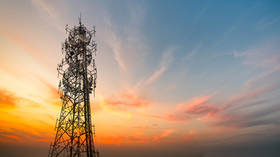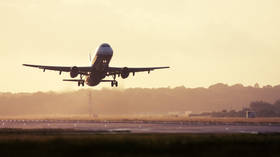5G rollout delayed after airline protest

Major US cell carriers have agreed to postpone the planned rollout of 5G service near several American airports, citing the concerns of airlines that doing so would endanger air traffic safety.
AT&T and Verizon said Tuesday they would delay the rollout of new cell towers near “some” airports, though it did not specify which, and work with federal regulators to resolve the dispute over potential interference.
The White House hailed the agreement, saying it “will avoid potentially devastating disruptions to passenger travel, cargo operations, and our economic recovery.”
The move comes after the trade group Airlines for America sent a letter to the US government warning that “thousands” of flights could be grounded or delayed as a result.
“To be blunt, the nation’s commerce will grind to a halt,” the CEOs of American, Delta, United and Southwest airlines said in the letter, arguing that interference from the 5G service would be worse than originally projected. “Unless our major hubs are cleared to fly, the vast majority of the traveling and shipping public will essentially be grounded. This means that on a day like yesterday, more than 1,100 flights and 100,000 passengers would be subjected to cancellations, diversions or delays.”
At issue is the potential interference of 5G signals with radar altimeters, which help pilots land in low visibility. The frequency used by the wireless service was described as “close” to that on which some of the altimeters operate. The airlines demanded a permanent, two-mile buffer zone around US airports to avoid this interference.
The Federal Aviation Administration (FAA) and the Federal Communications Commission (FCC) have not been able to resolve the impasse for the last several years.
AT&T and Verizon have said their signals would not interfere with aircraft instruments and that the technology has been safely used in many other countries. They originally planned to set up their 5G service in early December, and have already delayed it twice due to the dispute with the airlines.
The most recent delay came on New Year’s Eve, after an intervention from Transportation Secretary Pete Buttigieg and FAA Administrator Stephen Dickson. As part of that deal, the two telecoms agreed to reduce the power of their signal near 50 US airports for six months, while the FAA and DOT promised not to block the 5G rollout any further.
However, the airlines complained that the planned buffer only affects the last 20 seconds of flight, and the companies are demanding a larger exclusion zone such as the one established in France, which extends to 96 seconds.













